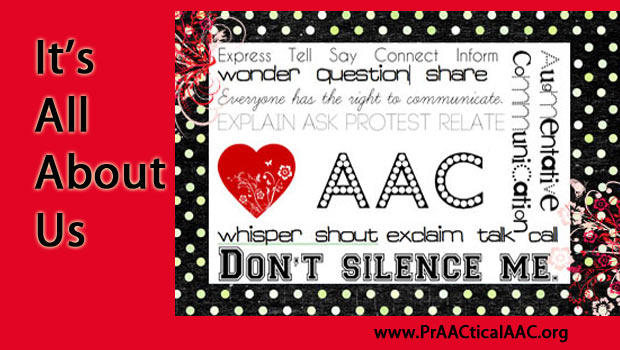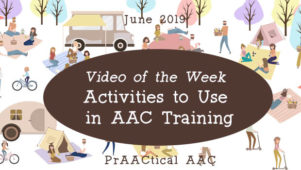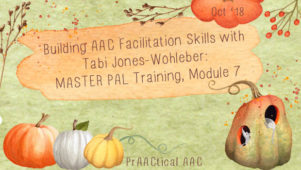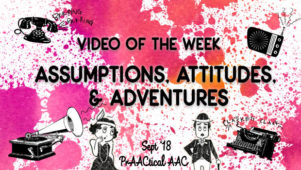It’s All About Us

No one wants to be ‘that’ professional. You know him or her. The one who always sees the glass as half empty. The one who can give you a long list of things his/her clients can’t do, won’t be able to do. The one is quick to give a dozen reasons why the AAC tools and strategies won’t work for his/her clients. The one who repeatedly says “We tried that and it didn’t work.”
I met a professional like this (haven’t we all??) at a workshop I was teaching on making AAC work in the classroom. She approached me at every break and was eager to talk. In these conversations she tried everything she could to get me to agree that her kids were “too low functioning,” that the AAC device was too high level for them, and that the parent’s expectations were unrealistic.
What struck me about this young teacher (and it could have just as easily been an SLP) was how committed she was to her point of view. To her, it was more important to be validated for what she was doing (which resulted in v-e-r-y slow gains for her students), than it was to to maximize student learning. She wasn’t asking me to assist her to help the students learn. She was asking me to say that it was okay not to try. Sigh. If I could just get her to spend one quarter of the energy that she used defending why she doesn’t do XYZ and turn it into effective communication teaching, her students would soar. AND would get what she really wanted: To feel like a good teacher.
I was tempted to counter every one of her arguments with more information, but as we discussed awhile back, sometimes the lack of information isn’t the root cause of the problem. Sometimes, it’s an attitudinal issue. Still, it was hard not to unleash a ton of resources and materials to get her going in the right direction. But where would that get me? She already had a lot of good information and resources that she wasn’t using. Would more really help?
Here’s what I said instead.

“Do you want to become THAT teacher?” “Is that what you want? To be known as the teacher who would rather be right than be good? The one who is constantly saying ‘My students can’t’ and ‘It doesn’t work?’ Because it sounds like that is who you are becoming. I think you should ask yourself: What kind of professional do I want to be?”
She approached me at every break so we ended up having several conversations. I challenged her to tap into her creative self, mobilize her problem-solving skills, and to view each obstacle as something that she could help her kids overcome. “It is our job to figure out how the students CAN do things,” I said over and over. “What kind of professional do you want to be?”
So often, it’s not about them. It’s about us. Who do we want to be?
The one who identifies problems or the one who goes on to solve them?
The one who defends past practices or the one who embraces new solutions?
The one who would rather be validated or the one who is looks for the most effective approach?
The one who says “can’t/don’t/won’t” or the one who says “can/do/will?”
The one who drags down the team or the one who inspires them?
We want to be prAACtical. Creative. Committed to looking at obstacles as problems to be solved. Effective. Okay with not being perfect, but striving to be a little better. How about you? What kind of professional do YOU want to be?
Filed under: PrAACtical Thinking
Tagged With: attitude, attitudinal barrier, Barriers, professional development, professionals, self-reflection
This post was written by Carole Zangari





1 Comment
Well-said!